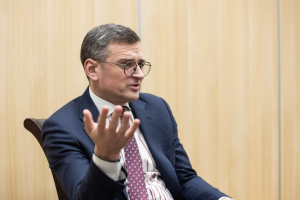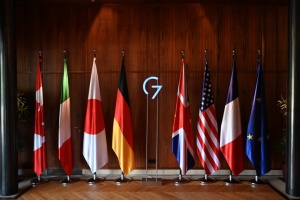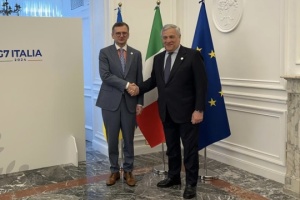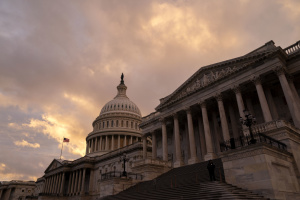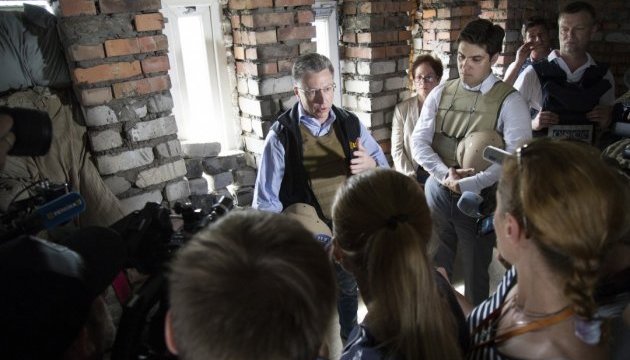
Kurt Volker: We will find a solution to Ukrainian question
U.S. Special Representative for Ukraine Negotiations Kurt Volker held a briefing for journalists at the State Department on Friday, November 3. The U.S. diplomat spoke about his vision of the situation in eastern Ukraine, the results of the work already done and outlined further directions of efforts. Ukrinform publishes in full the transcript of Volker's briefing.
MR GREENAN: So I think Ambassador Volker has some opening comments that he’ll make, and then we’ll jump right in to the questions. And got 30 minutes or so, maybe. So we’ll just kick it off with you, Ambassador.
AMBASSADOR VOLKER: Right. And this is on the record.
MR GREENAN: This is on the record, and we’re ready to go.
AMBASSADOR VOLKER: Okay. Well, it is great to be here, and I thought it would be a good opportunity to update all of you on what has happened now in the last three months and a bit since I was appointed to work on Ukraine issues for the U.S., and basically say I think we’ve seen a lot of movement, activity, some of it positive. And so I think it’s worth taking stock of where we are and what some of the next steps might be.
Let me start out by emphasizing that this is still a hot war. It’s an active conflict. Ten thousand plus people have been killed; over 2 million displaced persons. It goes on night and day. There are ceasefire violations every night, multiple ceasefire violations, and they recently ticked up again a little bit. There was a lull in September after a renewed effort at a ceasefire, it died down, and it’s ticked back up again. As we go into the winter, there are obvious concerns that people have on the humanitarian front, make sure that people have access to everything they need to survive well through the winter, which is not so easy because of the conflict.
And just imagine a Ukrainian soldier on average dies every three days, and in their own country, fighting to defend their own country. So imagine if that were in any other country – your home, and your soldiers are fighting on your own territory to protect the country. It’s just – it’s an extraordinary strain, and it is a conflict that really does need to be put to rest.
So what have we done? So we’ve gotten the U.S. very much engaged in the diplomacy around the Minsk agreement and seeing – and pressing forward to implementation. The problem over years has been kind of a circular argument where the Russian side is saying the Ukrainians are not implementing the political steps required under Minsk – things like amnesty and special status for eastern Ukrainian regions and elections. Ukrainians are saying we’re very happy to do those things if we can, but we can’t because we don’t have access to the territory, there is no ceasefire, there is no end to violence, they’re completely occupied; how can we do this as a physical, practical matter? And then in addition to that, it’s very difficult to get these things voted through the parliament in Ukraine when there’s a war going on in your territory and steps have not been taken to end the war.
So very, very difficult. What we have tried to do, then, as the U.S., is try to address that problem of a stalemate. And the way that we have discussed it is to first off recognize that Russia says that it does support the restoration of Ukraine’s territorial integrity and sovereignty through the Minsk agreements. That’s part of the Minsk agreements; Russia supports that. Russia also says that its concern is the safety and well-being of Russian-speaking people in Ukraine. If you look at Ukraine and you travel around and you talk with people – and I’ve done that, but anybody can do that – there are millions and millions of Russian-speaking people, they live all over Ukraine, and they’re fine. The only place where Russian-speaking people are facing difficulties is where the Russian forces are, which is in the occupied portions in the east. So – and that’s because there’s a conflict going on. And so those people are at risk, not any – not only Russian-speaking, people generally.
So if that’s a concern for Russia, then it’s something that we would agree on or could potentially agree on, and if the ultimate goal is the restoration of these territories to Ukrainian sovereignty, that’s also something that we agree on. So we’ve been trying to build on that and see whether it would be possible to create the conditions for a peacekeeping force, a UN-mandated peacekeeping force, to control the territory in eastern Ukraine. That would allow trust from both sides to be redeveloped – trust in the international UN force, at least – and that would create the opportunity for Ukraine to go forward with Minsk implementation steps such as holding elections, which it currently can’t do. So that’s what we would like to get to.
We’ve had a lot of diplomatic activity coordinating among Germany and France, which lead the Normandy process on this; the U.S.; the UK and Sweden, which are both sitting on the Security Council right now; Ukraine, of course – we’re not going to do anything over their heads, it’s their country, and so we’ve been in very close coordination – had five visits to Kyiv since July. So we’ve pulled this together very well. I’ve had two meetings with my Russian counterpart, Vladislav Surkov; seems to be a very smart, very serious interlocutor. We’ll see if we can make progress. And I’ll have a third meeting with him in Belgrade around the 13th of November.
And what we’d like to do – and I should add one more thing: So after my first meeting with Mr. Surkov, it was interesting to see that Russia went to the UN and proposed a UN protection force for eastern Ukraine. Now, the Russian proposal was only on the line of conflict and only to protect the OSCE monitors. But, of course, that’s what Russia’s position has always been, so it’s not a surprise that’s what they’re proposing. What’s interesting is they went to the UN to propose anything at all and to have a UN presence in eastern Ukraine which otherwise is something that had not been supported before.
So it was an interesting initiative from Russia, and we’ve engaged then in discussions about that both with Ukraine, France, Germany, et cetera, as well as with Russia, and the thing we’d like to see is whether that initiative can be developed further, because for a peacekeeping force to be effective, it would really need to control the entire contested area, to be responsible for the cantonment and the monitoring of heavy weapons, and to control the Ukrainian side of the Ukraine-Russia border. And if those things could happen, it could truly control security, you wouldn’t have a worry about the safety of Russian-speaking people or anybody – Ukrainian-speaking people, or anyone else, for that matter – with a peacekeeping force there, and that would be a way forward to then get back on track with Minsk implementation, which is the objective here.
And so that’s what we’re exploring. We are not in agreement on this yet. We’ll find out. As I said, my next meeting with Mr. Surkov will be in Belgrade in a couple of weeks. But there are – there’s been a lot of activity since July, and that activity is at least some reason for encouragement and we hope to continue to build on it.
So I will pause there and I would be delighted to answer any other comments, questions, et cetera, that you have.
MR GREENAN: Some questions. How about start with Nick?
QUESTION: Nick Wadhams from Bloomberg. Do you think that Russia is being a sort of trustworthy and honest interlocutor in this, or – I mean, is it your sense that they genuinely want to see this resolved, or are they interested in just prolonging this, dragging it out as long as possible to sort of make gains for themselves? I mean, when you speak with Surkov, do you feel like you’re sort of – this is a dialogue of trust and that you both want to get to the same objective but you’re getting sort of stalled on the details, or are there bigger issues with trust happening here?
AMBASSADOR VOLKER: Well, I guess I’m not that sentimental about it – (laughter) – is that it’s not about trust or not trust. It’s about what could we agree to do or not do. And there I find that the Russians seem to be seriously exploring the option. It doesn’t mean they’re committed to it, doesn’t mean they’ve made a decision. They could very well decide just to try to dig in, as they’ve done with Abkhazia or South Ossetia or Transnistria. They could do it in eastern Ukraine. But they know that the costs to doing that will be very high. It’ll continue to cement a more unified, more nationalist, more Western-oriented Ukraine; it’ll keep sanctions in place, because sanctions are there until the Minsk agreements are fully implemented; there are the costs of the military operation itself and the costs of civilian administration. There is the reputation to Russia of having invaded and taken territory from Ukraine. So there are a lot of costs that Russia is paying, which I think they’re conscious of. And it’s a choice for Russia, what do they want to do. They know that’s an option. It’s not a great option, but it’s an option, and they could do it.
Alternatively, if they want to get out, there are ways to do that. And that’s what exploring a peacekeeping force and a peacekeeping option can entail, and we would be happy to help. We want to see this resolved. We want to – from the beginning when Secretary Tillerson first announced my appointment, he said the U.S. objectives are the restoration of Ukrainian sovereignty and territorial integrity, and the safety and security of all Ukrainian citizens regardless of nationality, ethnicity, or religion. And that stands. That’s all we’re trying to do, and it’s actually things where I think we could agree with Russia. So if we can get the steps right, there are possibilities.
MR GREENAN: Francesco from AFP.
QUESTION: Francesco for AFP. You said you – that Russia went to the UN with this proposal after your first meeting. There was a second. You will soon have a third. Have you already noticed some evolution, flexibility from them, on this – the mandate of this peacekeeping force?
AMBASSADOR VOLKER: Yes.
QUESTION: Or for the moment it’s stalled?
AMBASSADOR VOLKER: Yes, yes. It’s always good to talk. It’s always good to have face-to-face meetings and discuss things. What we’re concerned about, as I mentioned, are: access to the entire conflict area – not just the line of contact but the contested area; cantonment and monitoring of heavy weapons; and the border. Russia appears to be concerned about linking a UN peacekeeping option to existing mechanisms, the Minsk agreements and their implementation, the Normandy process, and the mandate for the OSCE monitoring mission. Well, when you look at the mandate for the monitors, they have the authority to be in that entire contested area, just that they’re physically prevented from doing so right now because they get shot at, but they have that in their mandate.
So there’s actually, when you talk it through, there’s some common grounds that, well, that is an area. And this came up in a phone conversation between Chancellor Merkel and President Putin where she was raising this issue about having access to the entire area. And he was saying well, the SMM has that in its mandate already, and if the UN force is there to protect the OSCE, then they would be where the OSCE can be. So there is some possibility there.
And that would also be true of the border. The OSCE has it in its mandate that it can be throughout the area, which would mean up to and including the border. It’s prevented from doing so now, and it only gets temporary access to two locations. That’s not sufficient to actually control the border, but building on these existing mandates and developing a UN peacekeeping role that would be robust, then there perhaps is some common ground. So it’s worth exploring further. That’s where we are.
MR GREENAN: Dmitry from TASS.
QUESTION: Ambassador, can I ask you about the rebel part of the equation? You never said anything about the rebels. It looks as if the big powers are simply trying to negotiate between themselves over their heads. And despite U.S. Government desire to paint it in a brushstroke as a war between Russia and Ukraine, this is pretty much an internal strife. It has began as one, and it’s still pretty much the one. What about fostering a meaningful dialogue between Kyiv and the rebels?
AMBASSADOR VOLKER: Well, I disagree with your premise. It’s not an internal strife. It’s not an ethnic conflict; it’s not an indigenous conflict. It is one where on the eastern side you have 100 percent Russian command and control of what’s happening there, and on the Ukrainian side obviously it’s Ukraine, and nothing is decided. There are obviously people hired to work in the military operation, to work in the civilian administration, the so-called Luhansk and Donetsk people’s republics, people hired to do that. But this is Russian-directed, and so the relevant interlocutor here is Russia. And as I said, I think there’s reasons why we may actually be able to make progress, but I think that’s the relevant thing.
There is, of course, and let me state this clearly, in the Minsk mechanisms the Trilateral Contact Group, which is Ukraine, Russia, and the OSCE. That’s the trilateral. And in those meetings representatives of the so-called separatists are present. So there are opportunities for those people to be present in the Minsk process, but the leadership of this is Russia and the decision making is Russia, and the only way we’ll actually have a resolution is if we are in agreement with Russia.
MR GREENAN: Conor, ABC.
QUESTION: Thank you for doing this, Ambassador. This push towards peacekeeping troops in the region, does that then preclude U.S. lethal weapons to the Ukrainian Government? And has a decision been made either way on that?
AMBASSADOR VOLKER: Well, first off, this discussion of a peacekeeping option where you put in a UN peacekeeping force is a idea aimed at creating security and pushing ahead the Minsk implementation, the Minsk agreement’s implementation. But that stands on its own. It is a – it is an important concept.
The other concept that you’re raising is Ukraine’s self-defense. Every country under the UN Charter Article 51 has the right to self-defense. Ukraine has been facing a conflict on its own territory for the last three years. It produces a lot of weapons itself and has been – and done actually a very credible job of rebuilding its military after it was very badly beaten in 2014. It has rebuilt very substantially; it’s in good shape. And I think it is a reasonable thing for a country to defend itself, and it’s also reasonable for others to help countries defend themselves as well. So I think they’re just separate – separate conversations.
But what I led off with is this degree of – I don’t want to say that – degree of movement and a positive approach right now on developing an option for peacekeeping to see whether that can really help resolve the conflict, restore the territory, protect people, and get us to full implementation of the Minsk agreements.
QUESTION: So if – so has a decision been made either way?
AMBASSADOR VOLKER: I don’t have anything new on that. You’ve seen a lot of the discussion already, and I don’t have anything new to say on that.
MR GREENAN: Matt.
QUESTION: Have you guys – you guys have – already have told the Russians what you’re wanting to see out of the peacekeeping force?
AMBASSADOR VOLKER: Yes.
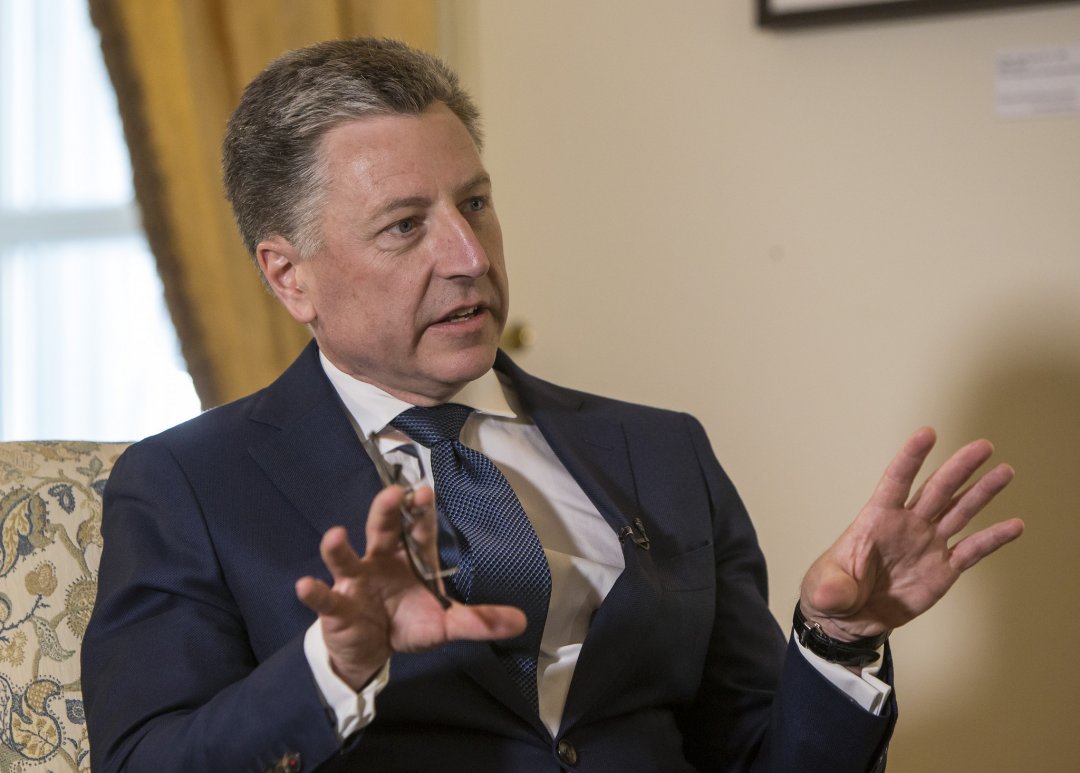
QUESTION: So are you hoping to get – it’s been presented to them. Are you hoping to get an answer from Surkov when --
AMBASSADOR VOLKER: Well, I’m hoping that when we meet in November we can have a detailed, serious conversation about that. So the sequence here is we kicked around ideas; Russia took the first step and took the initiative in proposing a UN Security Council resolution. It’s obviously what – reflecting the Russian going-in position, of course. And we have then discussed with Ukraine, discussed with France and Germany and others, and fleshed out okay, here’s what we think this would need to be to be effective.
I had an initial conversation with Surkov about that in October, and this is – gets to the earlier question we had. It was useful to do that because then I got a much better understanding of what some of the Russian concerns are and what some of the ones they’re not as concerned about. So that gave us some guidance as to – or guidance. It gave us a perspective on how to develop this idea further, which I spent the last few weeks doing with Ukraine, France, Germany, and others. And we’ll be getting back to the Russians now with some concrete suggestions.
QUESTION: Oh okay. So concrete suggestions on those areas, cantonment --
AMBASSADOR VOLKER: Yes.
QUESTION: But the general ones they already know, right?
AMBASSADOR VOLKER: Well, they knew it in concept, but we haven’t gone to them and said okay, now here is – having heard you, having taken what your concerns are and about linkage to existing mandates, Minsk, SMM support, we’ve taken that on board and tried to fit these things together, and we’ll be coming back with some ideas.
QUESTION: All right. So you’re not expecting him to come to – you’re not expecting to show up and him say all right, let’s go, or no, this is done?
AMBASSADOR VOLKER: No, I think we need a further conversation.
QUESTION: All right. And then the only other thing is --
AMBASSADOR VOLKER: But it’ll be on a much more specific level.
QUESTION: Right, okay. And then this is kind of just out of the blue, but I’m just wondering given all that we’ve seen happening here this week. And that is: Has what’s going on here with the Mueller investigation and the Manafort indictments, does that have any impact at all on your dealings with Ukraine, the Ukrainian --
AMBASSADOR VOLKER: It hasn’t had an impact. What I will say – and I was traveling last week; I was in Sweden, I was in Germany, I was in Ukraine – it gets noticed. It’s on everybody’s radar. But what I’ve been doing is just staying on task. The – I know it’s out there, I know you’re interested in it, there’s a lot to talk and read about, but --
QUESTION: You’re talking about the people that you’re dealing with?
AMBASSADOR VOLKER: Yeah. Oh yeah, everybody, everybody.
QUESTION: Right.
AMBASSADOR VOLKER: General public, journalists, officials, you can’t miss it. It’s --
QUESTION: Right.
AMBASSADOR VOLKER: -- bigger than an elephant in a room. (Laughter.)
QUESTION: But you don’t think it’s caused a distraction --
AMBASSADOR VOLKER: But – no. But what I do is I say, “Look, here’s where we are, here’s the question that we need to address. What do you think? How do we put it together?” And it’s actually – we’ve been able to do quite a bit just by staying on point.
MR GREENAN: Tatiana, RIA Novosti.
QUESTION: Hi. Thank you very much for doing this. Tatiana Kalmykova with RIA Novosti news agency. I have a follow-up question on this resolution, Russian initiative. Do you know if Ukraine is preparing their own draft of resolution? Because it was some rumor, some news circulated in September.
And second question: You – just going back and forth from Kiev to Washington, and do you have any plans of meeting the representative from these areas, Donbas and Lugansk, in the future? Is it possible at all?
AMBASSADOR VOLKER: Yeah. So Ukraine – it’s a couple of years ago – brought up the idea of a UN peacekeeping force in eastern Ukraine. At that time, Russia was not ready to explore that. When Russia then presented its ideas for a protection force in September, Ukraine was ready to come forward with its own proposal.
But since we’ve had some developments, discussions, getting the United States more engaged in this overall, discussions with the Russians directly about this, the Russians took the initiative to suggest something. We have discussed all this with Ukraine as well, and said, “Look, let’s not come up with competing resolutions. Let’s try to have a discussion about principles; about what an effective peacekeeping force needs to do, and see if we can actually reach some agreement, rather than getting into competing drafting exercises.”
And so that’s where we are. We’re at a discussion of the principles and the elements that would need to be in a future UN Security Council resolution. And if we can all agree, that would be the best way forward, so we’re not competing drafts like that.
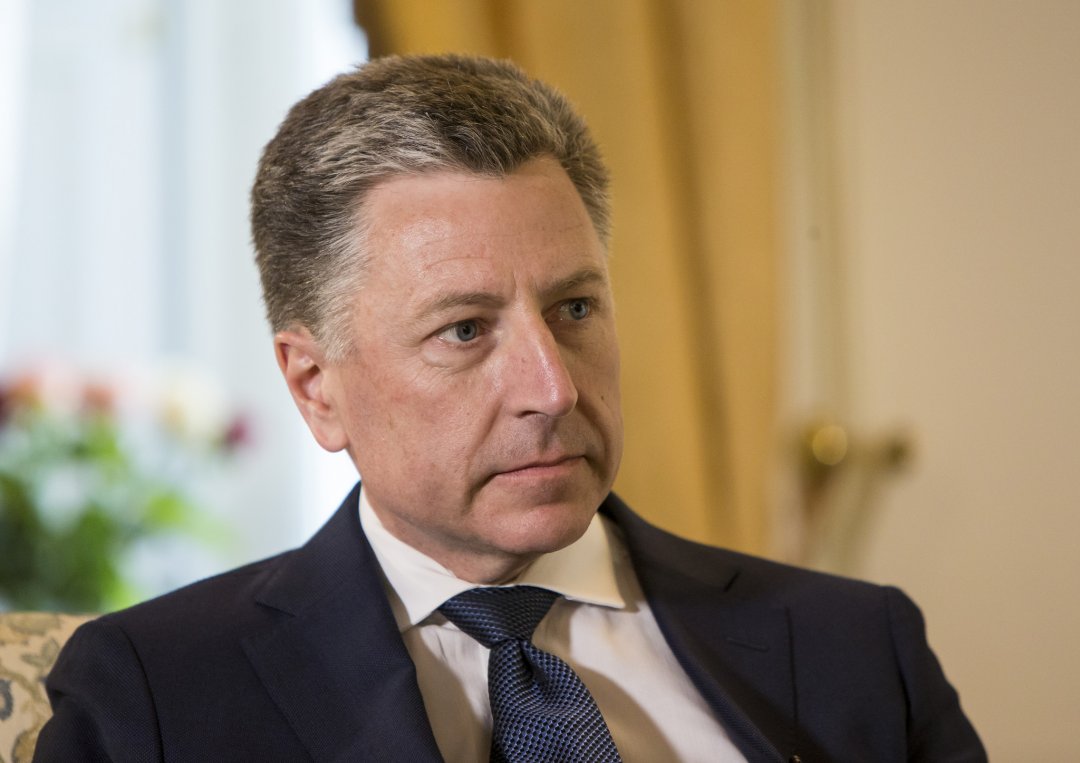
MR GREENAN: Paul, Wall Street Journal --
QUESTION: And on the meeting – possible meeting, or if – if you’re --
AMBASSADOR VOLKER: Well, as I said, the decision-maker here is Russia and I think that’s where I need to be dedicating the U.S. effort, is to engaging directly with Russia. If we resolve this, if we have peace, if we have safety for all the people in eastern Ukraine – Russian-speaking people and Ukrainian-speaking people and anyone else who is there – and we have the implementation of the Minsk agreements, and sovereignty is then restored to Ukraine, I would love to visit both Luhansk and Donetsk at that point and see that these territories are being rehabilitated.
QUESTION: Careful, because --
MR GREENAN: Paul, Wall Street Journal --
QUESTION: -- if you’re successful with doing that, they might make you the new Syria envoy. (Laughter.)
QUESTION: Can you tell us what the Russian sticking points are? There was some – I think there was some issue where they only wanted a peacekeeping force if Russians were involved in that peacekeeping force; is that off the table at this point?
AMBASSADOR VOLKER: No one has said that to me.
QUESTION: Okay.
AMBASSADOR VOLKER: No one has said that to me.
QUESTION: And – all right.
AMBASSADOR VOLKER: I would think that it’s important to have an impartial peacekeeping force.
QUESTION: But what are their sticking points? What are the issues that they are bringing up that are prevent – you have said --
AMBASSADOR VOLKER: Well --
QUESTION: -- what the U.S. wants to see, but what are their issues?
AMBASSADOR VOLKER: Yeah. Well, as I said, the thing that came up from the meeting that we had in October was existing frameworks – Minsk, Normandy, OSCE monitors – and part of Minsk, there is a degree of sequencing that is in Minsk. It’s not clear; there’s no clarity to timelines. It’s all just laid on a piece of paper with no timelines. But seeing political steps from the Ukrainian side is important to them.
So for example, the fact that Ukraine renewed the law on special status for eastern Ukraine on October 6th, I believe it was, that was an important step because that was a political step from the Ukrainian side to show that they are committed to that special status when it can be implemented. So I think it’s – those things are what’s been important to Russia.
It’ll be interesting at the next meeting to see if there’s any other things that come up specifically, but until now, that’s about what it’s been, and then we’ll have our next meeting in November.
QUESTION: Do you have any concerns that Russia might see a UN peacekeeping force as a way to actually secure the area for itself?
AMBASSADOR VOLKER: Well --
QUESTION: Without having to expend resources and money?
AMBASSADOR VOLKER: Look, I think it’s a binary choice for Russia. Would it like to create another frozen conflict, occupied territory, like Abkhazia or South Ossetia or Transnistria, which as I said carries with it very high costs, but it’s doable. If they want to, they will, but it’s a very high-cost enterprise and sad too, because you hate to see this conflict between Russia and Ukraine continue, you hate to see Russian soldiers being killed. It’s terrible. So hopefully we can avoid that.
And the alternative is for Russia to withdraw and facilitate a deployment of a UN peacekeeping force which creates peace for everybody and allows Minsk implementation to go forward. That would be the other scenario. I don’t see a scenario where this becomes indefinite, certainly not from an international community position. I don’t think anyone wants a Cyprus solution – (laughter) – which is a – I don’t know how many years we’ve been peacekeeping in Cyprus now, and I don’t think Ukraine wants that. They obviously want to restore the territory to Ukrainian sovereignty, and as a result, they have a high incentive to get on with implementing the Minsk agreements.
MR GREENAN: Abbie, NBC.
QUESTION: Hi, Abigail Williams with NBC. I wondered – you talked about there being a relatively peaceful month in September, then an increase in violations around the same time as Russia’s coming forward with this proposal of a UN peacekeeping group. Wondered what – if there was any contradiction in that increase in violations --
AMBASSADOR VOLKER: Yeah. So --
QUESTION: -- and why now --
AMBASSADOR VOLKER: Okay.
QUESTION: -- that they’re choosing to come forward with this after the conflict going on for so long?
AMBASSADOR VOLKER: Yeah. So let me get the sequence right so that it’s there. So I met with Mr. Surkov on August 24th. On September 5th, Russia proposed a UN protection force for OSCE monitors on the line of conflict. Around September 1st through a phone call of the Normandy format – I think it was the 1st – President Putin, Merkel, Poroshenko, Macron, they agreed on a back-to-school ceasefire which was intended to reduce levels of violence at the beginning of the school year and is – let’s get back and get on track again.
That did have an impact. It did reduce levels of violence probably by three-fourths for a couple of weeks. And then it has ticked back up and two weeks ago was a particularly bad week, including a lot of fire from heavy weapons. It’s been kind of zigzagging around. It is still at lower levels than it was at the beginning of the year. February was a very bad month, for instance. But it is up from where it was in September.
When you talk to the OSCE monitors, they say that they – they often see patterns like this. They see them partly for political reasons, they see them partly related to troop rotations, they see them partly related to weather. So there’s a whole lot of potential explanations. If you think about the timing that we laid out, you had the Normandy call, you had this agreement on a back-to-school ceasefire, you had the Russian dropping of a draft resolution, you’ve had engagement on that since, and you’ve had a slow uptick in the last two weeks of levels of ceasefire violations. I’m not sure what the reason for that would be other than it is an ongoing conflict and people are still there, people are still firing snipers, mortars, and there’s responses to that from the Ukrainian side, and so it happens. And that’s the tragedy of this, is that – that’s why we’d like to really get a lasting solution, a real ceasefire, a separation of forces, a cantonment of heavy weapons, and an area security peacekeeping force that allows the violence to stop and political steps to go ahead.
MR GREENAN: Dave Clarke, AFP. I think that’s our last question.
QUESTION: Hi, Dave Clarke, AFP. Apologies if this was dealt with before I came in. I came in a little bit late. Since I’ve come in, though, I’ve only heard about Luhansk and Donetsk. Is – does Crimea figure in this at all?
AMBASSADOR VOLKER: Well, that’s a great question, and thank you for bringing it up. The principle here is the same, that you have Russia invading and occupying territory. In the case of Crimea, it has also claimed to annex that territory. So we view these the same way: don’t recognize any of that and will not recognize any of that.
If we have a chance to make progress on one of the conflict areas, eastern Ukraine – and that’s the one that the Minsk agreements are meant to address – then we should make progress. Why – let’s not hold back because of Crimea, but that doesn’t change our approach concerning Crimea either. We don’t accept the occupation and annexation of that.
And the Minsk agreements are from 2014. That created the Normandy process. That’s the diplomatic effort that I’ve been asked to get engaged in, so that’s why I’m talking about that. But the overall U.S. position is unchanged on this.
QUESTION: But part of your process when you’re dealing with Luhansk and Donetsk is that there will be sanctions relief if the Russians cooperate. Can they have sanctions relief if Crimea remains --
AMBASSADOR VOLKER: Yes. There are sanctions that are related to Russia’s claimed annexation of Crimea, and there are also sanctions that relate to non-implementation of the Minsk agreements. There are also sanctions in place for other reasons, like Magnitsky, for example. When we talk about sanctions relief here, we are talking about those sanctions that have been put in place as a result of the conflict in eastern Ukraine and the failure to implement the Minsk agreements. And if they are fully implemented, then there would be sanctions relief commensurate with that. Those sanctions put in place would then be in a position to be lifted. And that’s a coordinated position by both the U.S. and the EU.
MR GREENAN: Thank you, Ambassador Volker. (Inaudible) very much.
AMBASSADOR VOLKER: Thank you.
QUESTION: Do you know, though – I mean, maybe this is better put to Treasury or someone – that if there is – if they do get relief under the stuff for the east, will there really be – will they see any benefit from that given the fact that they’re so heavily sanctioned under the other – under the others?
AMBASSADOR VOLKER: My understanding is that Minsk-related sanctions are significant, and so I think they would come --
QUESTION: But they’re not – they don’t come underneath the broader – the Crimea ones?
AMBASSADOR VOLKER: No.
QUESTION: So --
AMBASSADOR VOLKER: No, the – what happened – and we’re going back in time to 2014 – is no one really believed that Crimea was going to happen. And then when they did it, there was still a measure of disbelief, and so there were sanctions, but they didn’t go whole hog. And then when they did it a second time, then the sanctions were more severe. And so now, getting the Minsk-related sanctions lifted after full implementation of the Minsk agreements, I think, would be significant.
All right.
MR GREENAN: Terrific. Thank you, everybody.
AMBASSADOR VOLKER: Thank you.
QUESTION: Thank you.
AMBASSADOR VOLKER: Thanks.

